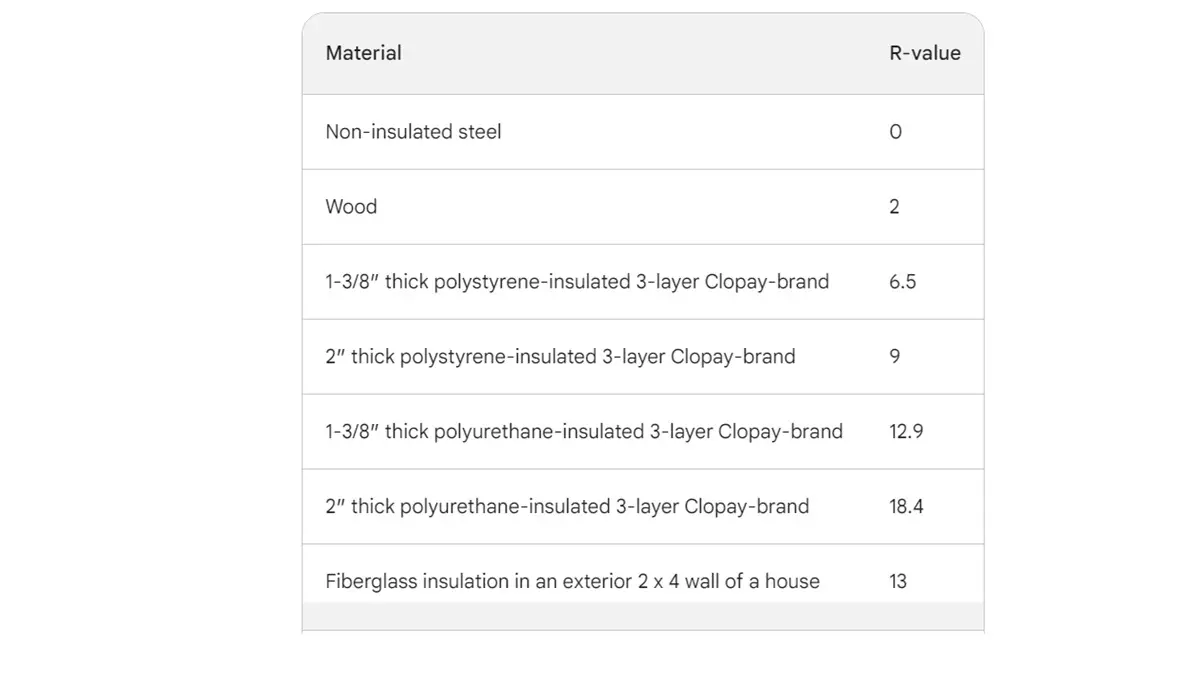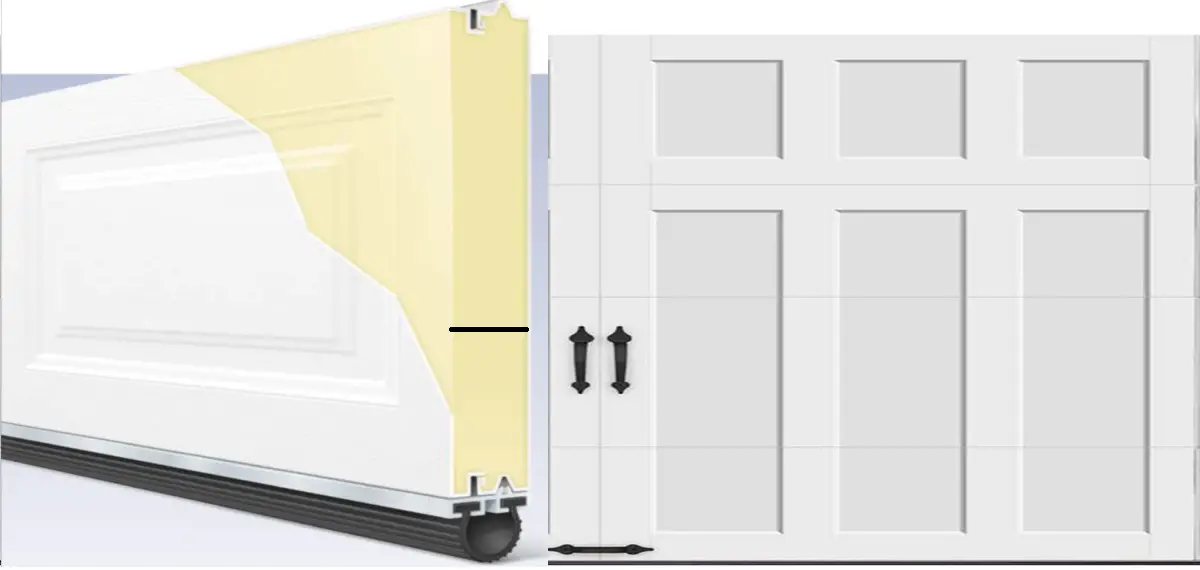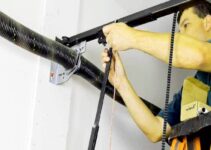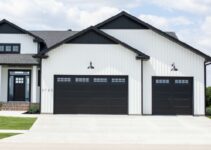R-Value Garage Door
In the fast-paced world of home improvement, one crucial aspect often overlooked is the garage door’s insulation. The mysterious “R-value” holds the key to unlocking energy efficiency and comfort within your living space. In this comprehensive guide, I will unravel the significance of R-values and explore various garage door options to empower you with the knowledge needed to make an informed decision.
Understanding R-Value

R-value, or thermal resistance, isn’t just jargon thrown around in the building industry—it’s your ticket to understanding how well a garage door can resist the transfer of heat. Picture it as a superhero shield, protecting your home from the extremes of weather and ensuring a cozy atmosphere inside.
Non-Insulated Steel Garage Door (R=0)
Let’s start with the humble R=0, the non-insulated steel garage door. Imagine it as a gateway for temperature fluctuations and potential discomfort. While cost-effective, these doors may leave your garage feeling like an oven in summer and a freezer in winter. Not the ideal scenario for your prized possessions or your car.
Wood Garage Door (R=2)
Enter the wood garage door with an R-value of 2—an improvement, indeed. Wood brings an aesthetic charm, but is the slight boost in insulation enough to justify its higher price tag? We’ll weigh the pros and cons, ensuring you make a choice that aligns with both your style and budget.
Polystyrene-Insulated 3-Layer Clopay Garage Door (R=6.5)
Now, let’s explore the 3-layer Clopay garage door with polystyrene insulation, boasting an R-value of 6.5. It’s like giving your garage a warm hug. We’ll delve into the intricacies of polystyrene insulation and how it elevates your garage from a simple storage space to a comfortable extension of your home.
Highly Insulated Clopay Garage Door (R=12.9)
If you’re serious about insulation, the polyurethane-insulated 3-layer Clopay garage door, boasting an R-value of 12.9, is your go-to option. This garage door isn’t just a barrier; it’s a fortress against temperature extremes. Let’s explore why investing in high R-values pays off in the long run.
Comparative Heat Flow Charts
Numbers can sometimes be elusive, so let’s bring in the visual aid. Heat flow charts will be your guide, showing the percentage of heat blocked by different R-values. It’s a visual feast that makes understanding the impact of insulation levels a breeze.
Garage Door Insulation and Home Energy Efficiency
Your garage door isn’t an isolated entity; it’s an integral part of your home’s energy efficiency system. Discover how the right garage door insulation can ripple through your entire living space, leading to reduced energy costs and a more sustainable lifestyle.
Polyurethane-Insulated 3-Layer Clopay Garage Door (R=18.4)
For the connoisseurs of insulation, we present the polyurethane-insulated 3-layer Clopay garage door with an R-value of 18.4. It’s not just about blocking heat; it’s about providing your home with the best possible thermal resistance. We’ll uncover the hidden gems of this top-tier garage door.
Maximum Insulation: R=20 Garage Door
For those who crave the utmost in insulation, our journey leads to the pinnacle—an R-value of 20. This garage door doesn’t just block heat; it orchestrates a symphony of energy efficiency, offering unparalleled comfort and savings. We’ll explore why this option is the crown jewel of garage door insulation.
Fiberglass Insulation in House Walls (R=13)
Comparisons are illuminating. We’ll draw parallels between garage door insulation and house wall insulation, focusing on the R=13 fiberglass insulation. Understanding the role of fiberglass helps you draw insights into the choices available and their broader implications for your home.
Factors Affecting R-Value Performance
The journey doesn’t end with the garage door installation. External factors can influence R-value performance. Dive into the nitty-gritty details, from weather conditions to regular maintenance, to ensure your insulation remains effective for the long haul.
Choosing the Right R-Value for Your Location

Your location isn’t just a dot on the map; it’s a key determinant in choosing the optimal R-value for your garage door. We’ll guide you through the considerations, helping you align your insulation choice with the unique climate and conditions of your region.
Installation and Maintenance Tips
Selecting the right garage door is just the beginning. Professional installation ensures your investment pays off, and routine maintenance keeps the insulation performing at its peak. Discover the essential tips for both, making your journey towards energy efficiency smoother.
Conclusion
As we conclude this insightful exploration of garage door insulation, remember that the R-value isn’t just a number; it’s your shield against energy waste and discomfort. From the basic non-insulated steel doors to the fortress-like R=20 options, the market offers choices for every need. By considering factors like climate, maintenance, and personal preference, you can embark on a journey towards a more energy-efficient and comfortable home.
Frequently Asked Questions
What is R-value, and why is it important for garage doors?
R-value measures a garage door’s ability to resist heat flow, influencing its insulation effectiveness and, consequently, your home’s comfort.
Can a garage door impact the overall energy efficiency of my home?
Absolutely. A well-insulated garage door contributes to improved energy efficiency throughout your home, leading to potential cost savings.
What are the long-term benefits of investing in a garage door with a higher R-value?
A higher R-value provides better insulation, resulting in increased energy savings, consistent temperatures, and enhanced comfort in your garage and home.
How do external factors affect the performance of garage door R-values?
Factors like weather conditions and regular maintenance play a role in preserving the effectiveness of garage door insulation over time.
Is professional installation necessary for high R-value garage doors?
Yes, professional installation is crucial to ensure the garage door functions optimally in terms of insulation and overall performance.


